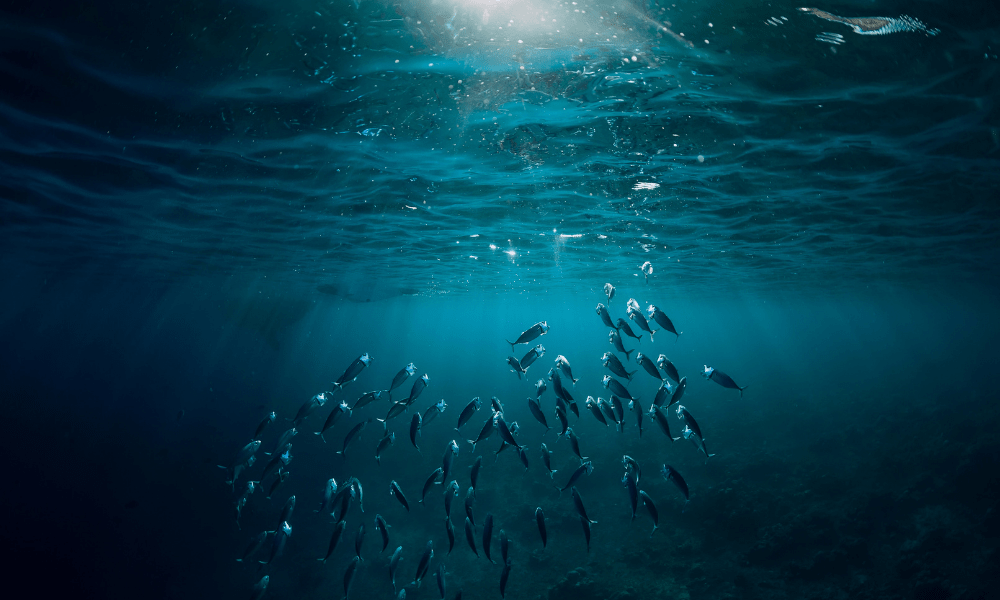You probably know that there are important omega-3 fatty acids that you should consume daily. But maybe you are unsure where to get them from: from fish, from krill or from algae? We will give you This article will give you a guide to help you make your decision easier.
At the end of the article there is a voucher for our Vegan Omega-3 waiting for you. It's worth reading on!
A little refresher: Omega-3 fatty acids
Omega-3 fatty acids are a family of polyunsaturated fats found in plants and fish. They provide essential fats that your body cannot produce on its own, so you must get them from your diet.
Here we have three detailed articles about omega-3 fatty acids that will tell you everything you need to know:
- Omega-3 fatty acids: effects and foods
- Omega-3 deficiency: what are the consequences?
- Omega-3 foods: These are the best sources

Candidate number one: fish oil
Fish oil is extracted from fish tissue. It usually comes from oily fish, such as tuna, mackerel or herring. The omega-3 fatty acids contained in fish offer many health benefits and are said to protect against a number of diseases. You can read about them in this article that we have put together for you.
The German Nutrition Society (DGE) recommends eating fish once or twice a week.
Fish oil is made up of about 30 percent omega-3 fatty acids, while the remaining 70 percent is made up of other fats. In addition, it also usually contains some vitamins A and D. The main omega-3 fatty acids in fish oil are eicosapentaenoic acid (EPA) and docosahexaenoic acid (DHA), while the omega-3 fatty acids in plant sources are mainly alpha-linolenic acid (ALA).
Although ALA is an essential fatty acid, EPA and DHA are said to offer greater health benefits, according to a study published in The American Journal of Clinical Nutrition .
Candidate number two: krill oil
Krill oil is a dietary supplement that has quickly become popular as an alternative to fish oil. It is made from krill, a type of small shrimp consumed by whales, penguins and other Arctic marine life.
Like fish oil, it contains DHA and EPA, types of omega-3 fats found only in marine sources. They have important functions in the body and are linked to a variety of health benefits, according to research in the journal Food & Function .
In our article you will find further information about krill oil, such as how it can support your health and how best to take it.
Krill oil also looks different than fish oil. While fish oil typically has a yellow hue, a naturally occurring antioxidant called astaxanthin gives krill oil its typical reddish color.

Candidate number three: algae oil
Algae! These marine organisms are now mostly grown in labs for their unique oil, which is packed with omega-3 fatty acids. While fish oil also provides omega-3 fatty acids, algae oil can be a great plant-based alternative if you can't eat seafood, are intolerant to fish oil, or are vegan.
The algae family itself includes around 40,000 species that rely on energy from sunlight or ultraviolet (UV) light and carbon dioxide. Microalgae biofactories are considered a promising approach for the sustainable production of omega-3 fatty acids, as shown by a study published in the journal Microbial Cell Factories .
Seaweed and algae also provide EPA and DHA, just like their animal competitors. However, since fish are not able to produce EPA and DHA themselves, they must ingest these substances by eating microalgae. Algae are therefore the actual source of the omega-3 fatty acids in fish.
If you would like to learn more about algae oil, be sure to check out our article on this topic.

Fish oil vs. krill oil vs. algae oil
So what? Which source of omega-3 should you choose? You probably need more information, right? OK, let's look at what the research has to say on the subject. Let's get the information!
- Info 1. The fatty acids in fish oil are in the form of triglycerides, while those in krill oil are in the form of phospholipids. A study from 2015 suggests that the fats contained in krill oil are therefore easier for the body to use than those in fish oil.
- Info 2. Algae, on the other hand, are considered the primary source of omega-3 fats, and all fish - whether wild or farmed - get their omega-3 content from eating these same algae, as can be read in an article on the website of the German Federal Environmental Foundation .
- Info 3. A study found that the percentage of omega-3 fatty acids in microalgae is comparable to that of various fish.
- Info 4. Fish oil is best known for its positive effects on heart health. However, several studies have shown that krill oil can also improve heart health. For example, in a controlled study, participants with high blood cholesterol took either fish oil, krill oil or a placebo daily for three months. The doses varied according to body weight. After this time, both fish oil and krill oil were found to improve several risk factors for heart disease. However, the study also showed that krill oil was more effective than fish oil at lowering blood sugar, triglycerides and "bad" LDL cholesterol, even though it was given in lower doses.
- Info 5. Studies using DHA-rich algae oil have shown that taking 1,000-1,200 mg per day reduced triglyceride levels by up to 25 percent, improved cholesterol levels and thus contributed to heart health.
- Info 6. In another study - published in the journal Lipids in Health and Disease - participants were given either fish or krill oil and the levels of fatty acids in their blood were measured over the next few days. Over 72 hours, blood concentrations of EPA and DHA were higher in those who took krill oil. These results suggest that participants utilized the krill oil better than the fish oil.
- Info 7. On the other hand, a two-week study with 31 people showed that taking 600 mg of DHA from algae oil per day increased the same percentage of DHA in the blood as taking an equal amount of DHA from fish oil - even in a vegetarian group with low DHA levels at the start of the study.
Don’t forget: the environmental factor
According to the United Nations’ SOFIA report ( The State of World Fisheries and Aquaculture ), each person today eats an average of 19.2 kg of fish per year – about twice as much as 50 years ago.
One reason why marine species have declined by more than 39 percent in the last 40 years, as the WWF's Living Planet Report shows.
Algae, on the other hand, grow very quickly and do not contribute to overfishing of the oceans. For this reason, they are possibly more sustainable than food supplements made from fish or krill oil. The consumer advice center also shares this opinion.
In addition, because algae oil is grown and purified under controlled conditions, it is free of toxins that can be found in fish and fish oils.
To support sustainable fishing efforts - and to ensure you're getting the highest quality product - make sure the fish and krill oil you use was sourced using sustainable methods.
Conclusion: And the winner is...
... none! Or all of them, depending on how you look at it. Fish oil, algae oil and krill oil are all reliable sources of omega-3 fatty acids.
Krill oil appears to have a health advantage over fish oil because it may be more bioavailable, whereas fish oil is easier to obtain.
Algae oil is a plant-based source of EPA and DHA. It offers the same benefits as fish oil, but is a better choice if you don't eat fish, follow a plant-based diet, or don't like the taste or aftereffects of fish oil. Its production is also environmentally friendly.
Ultimately, it is a matter of personal preference and tolerance whether you use fish, krill or algae oil.
We at +Viktilabs have a 20% voucher for all readers of this article for our
Vegan Omega-3 provided and thank you for your attention.
Simply copy the voucher code OMEGA3-20+V and enter it at the checkout.
Click here to go to the product
[1] https://pubmed.ncbi.nlm.nih.gov/25398754/
[2] https://pubmed.ncbi.nlm.nih.gov/16825676/
[3] https://pubmed.ncbi.nlm.nih.gov/25285409/
[4] https://pubmed.ncbi.nlm.nih.gov/25062404/
[5] https://www.ncbi.nlm.nih.gov/pmc/articles/PMC3465194/
[6] https://pubmed.ncbi.nlm.nih.gov/31698772/
[7] https://onlinelibrary.wiley.com/doi/full/10.1111/1541-4337.12396
[8] https://pubmed.ncbi.nlm.nih.gov/26357480/
[9] https://www.ncbi.nlm.nih.gov/pmc/articles/PMC3465194/
[10] https://pubmed.ncbi.nlm.nih.gov/31698772/
[11] https://www.ncbi.nlm.nih.gov/pmc/articles/PMC3465194/
[12] https://pubmed.ncbi.nlm.nih.gov/15656713/
[13] https://www.sciencedirect.com/science/article/abs/pii/S1756464614002229
[14] https://link.springer.com/article/10.1007/s13410-013-0125-3
[15] https://pubmed.ncbi.nlm.nih.gov/25884846/
[16] https://www.sciencedirect.com/science/article/abs/pii/S1756464614002229
[17] http://www.fao.org/fishery/sofia/en
[18] https://livingplanet.panda.org/
[19] https://www.ncbi.nlm.nih.gov/pmc/articles/PMC3465194/
[20] https://pubmed.ncbi.nlm.nih.gov/31698772/

















